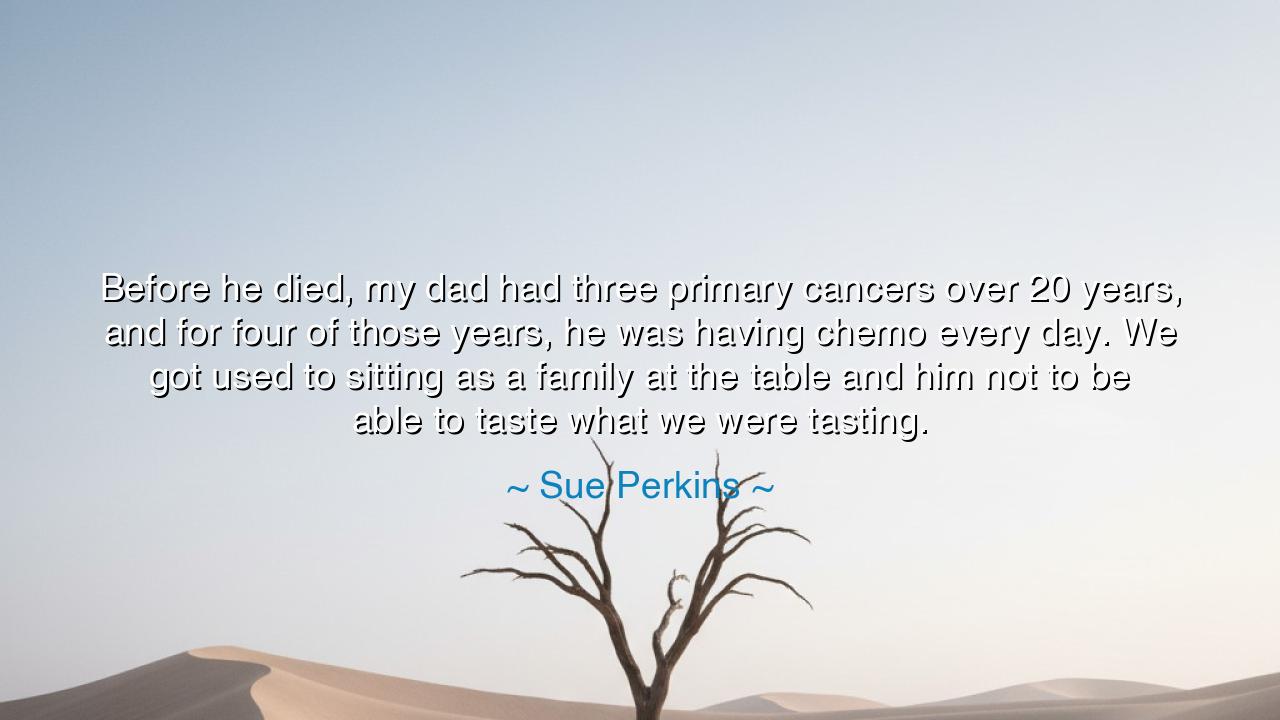
Before he died, my dad had three primary cancers over 20 years
Before he died, my dad had three primary cancers over 20 years, and for four of those years, he was having chemo every day. We got used to sitting as a family at the table and him not to be able to taste what we were tasting.






“Before he died, my dad had three primary cancers over 20 years, and for four of those years, he was having chemo every day. We got used to sitting as a family at the table and him not to be able to taste what we were tasting.” — Sue Perkins
Thus spoke Sue Perkins, not as a comedian or television host, but as a daughter — one who bore witness to the long, quiet battle of a loved one against suffering. Her words are tender, yet they cut deep, like a blade forged in sorrow and love. Beneath their simple rhythm lies a truth as ancient as humanity itself: that endurance, love, and loss often share the same table. This is not a story of despair, but of the silent strength that families summon when life tests them beyond measure. In her remembrance of meals shared and sensations lost, Sue Perkins paints a portrait of devotion — one that teaches us that love endures even when joy fades, and that presence is a form of grace.
Her father’s struggle — three cancers over twenty years, the unrelenting toll of daily chemotherapy — reveals the kind of courage rarely sung about in tales of heroism. It is not the bravery of battlefields or empires, but of kitchen tables and ordinary days. This is the courage of the quiet, of those who suffer without spectacle, whose victory lies in simply continuing. In that small act — sitting with his family though he could not taste the meal before him — her father embodied the spirit of human dignity: to stay connected to love even as pain devours the body. For what is greater than the soul that refuses to withdraw from those it loves, even when the world has grown flavorless?
The family table in Perkins’s memory becomes a sacred altar of endurance. Around it, they learned a new language — one spoken not in words, but in gestures of care, in patience, in shared silence. They ate together knowing that one among them could no longer share in the pleasure of taste. Yet he was still part of the ritual, still present. And perhaps that presence meant more than the meal itself. For in times of suffering, it is not the feast but the fellowship that sustains us. Their table was no longer just a place for nourishment — it became a sanctuary of love’s persistence, a reminder that affection can outlast even the simplest human joys.
Throughout history, there have been those who endured suffering not with complaint, but with quiet nobility. Consider Job, the ancient figure of faith who, stripped of wealth, health, and comfort, still whispered, “Though He slay me, yet will I trust in Him.” Like Job, Perkins’s father faced pain not with despair but with the humility of acceptance — the courage to remain present, to keep sitting at the table of life. His silence spoke louder than words: that even when the sweetness of the world fades, the act of being with those you love remains its own form of triumph.
This quote reminds us that love is not measured by perfection, but by persistence. The family did not turn away from sorrow; they adapted to it. They “got used to sitting at the table,” not out of numbness, but out of reverence for the time that remained. There is a wisdom here for all who live in the shadow of illness or loss: that to keep loving in the midst of suffering is to affirm life’s meaning. The body may weaken, the senses may dull, but the heart, if tended with compassion, can still taste what the tongue cannot.
So let this story be a lesson for all who walk the fragile road of love and loss. Cherish the small moments — the shared meal, the quiet evening, the simple presence of those dear to you. Do not flee from pain; stand beside it, as Sue Perkins and her family did, with tenderness and strength. For in this mortal world, joy and sorrow are woven together, and love is the thread that holds them fast.
Therefore, my child of the future, remember this truth: life is not about avoiding suffering, but about transforming it. When someone you love can no longer share the sweetness of the world, be the sweetness they have lost. Sit beside them. Hold their hand. Speak less, love more. For one day, when the table is emptier and the laughter quieter, you will know that presence — simple, steadfast, unspoken — is the greatest gift we can give to one another. And that, like Sue Perkins’s father, those who suffer in silence may still teach the living how to love with unshakable grace.






AAdministratorAdministrator
Welcome, honored guests. Please leave a comment, we will respond soon